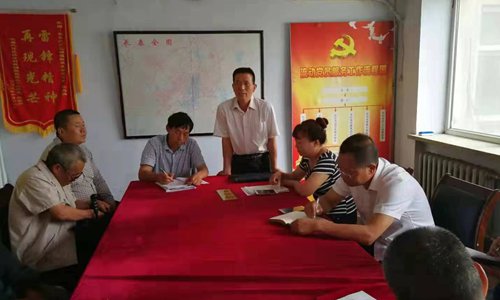HOME >> CHINA
CPC’s rural role highlighted
By Zhang Hui Source:Global Times Published: 2019/6/25 21:58:40
Guidelines urge improved governance led by Party

The Party branch for the migrant population in Changchun, Northeast China's Jilin Province, holds a meeting to discuss a new waste recycling project on April 12, 2018. Photo: Courtesy of Jiang Shun
A new set of guidelines to enhance China's rural governance highlighted the role of stronger leadership of the Communist Party of China (CPC), and proposed measures to shore up the weak links, including weak Party organizations, mafia-like gangs and clans.
The guidelines issued by the General Office of the CPC Central Committee and the State Council on Sunday said that China aims to develop an institutional structure and policy system for modern rural governance by 2020 with primary-level CPC organizations playing a leading role, self-governance by villagers further enhanced and consultation systems on village affairs better established.
By 2035, the country plans to improve public services, public management and security, and perfect the Party-led rural governance model which combines self-governance, rule of law, and rule of virtue.
The guidelines listed 17 main tasks, prioritizing the improvement of systems and mechanisms of rural governance led by Party organizations at village level.
"Governance of rural areas has been highlighted since early this year, when the country released its No.1 central document for 2019 to help China achieve its 2020 goals of building a moderately prosperous society in all respects and completely eradicating poverty," Du Xiaoshan, a researcher at the Rural Development Institute of the Chinese Academy of Social Sciences, told the Global Times. Du noted that rural areas have been weak points in realizing the goals.
China's rural areas are in a period of great change, with permanent rural population reduced by 300 million in two decades from 860 million in 1995 to 560 million in 2018.
Due to reduced population, villages have been plagued by the "hollow village" phenomenon which leaves children, women and seniors in villages while young adults move to urban areas for work.
Other behaviors that go against social moralities have emerged, including ostentatious betrothal gifts, Han Jun, vice minister of agriculture and rural affairs, told a news conference on Monday.
To solve these issues, it requires a strong rural Party organization, which could guide the rural culture and strengthen the moral construction in villages as required in the guideline, experts said.
Acute problems in rural governance must be tackled to consolidate the foundation of the Party's governance in rural areas and meet the people's need for a better life, Han said. Some rural Party organizations are poorly organized and some rural Party members failed to play an exemplary role, Han said.
Some rural Party organizations are poorly organized, some have seen their leadership roles weakened, and some rural Party members failed to play an exemplary role, Han said.
Weak rural Party organizations could lead to poor implementation of government policies and ultimately affect the development of the rural areas, Zhuang Deshui, deputy director of the Research Center for Government Integrity-Building at Peking University, told the Global Times.
Moreover, experts said that a lack of cohesiveness and combat effectiveness in rural Party organizations will shake the Party's ruling foundation in the countryside.
According to the guidelines, rural Party organizations will assume a greater role in leading other village organizations, and Party members will be encouraged to enhance their bond with the people and play an exemplary role.
In addition to strengthening the CPC's leadership, the guidelines put forward tasks in honing villagers' ability to self-govern, introducing various consultation mechanisms for village affairs and providing better cultural services for rural residents.
Five ministries, including the Ministry of Agriculture and Rural Affairs, will unveil 100 pilot county-level areas, 100 towns and 1,000 villages as the pilot and model regions of rural governance, Han said.
Posted in: SOCIETY,CHINA WATCH